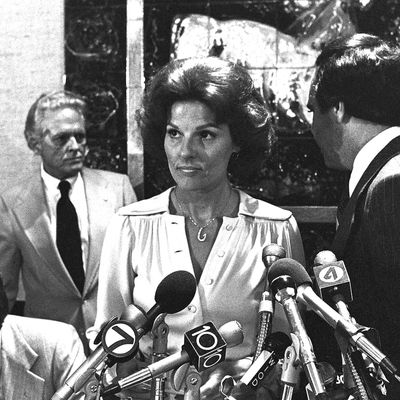
By some measures, Anita Bryant almost lost everything. The singer and former beauty queen enjoyed a high-profile entertainment career and a lucrative stint as the spokeswoman for the Florida Citrus Commission until the late 1970s, when she sacrificed it all on the altar of anti-LGBTQ+ hatred. Bryant, whose death from cancer last month was announced on Thursday evening, called homosexuality an “abomination” and founded the anti-LGBTQ+ group Save Our Children to campaign against an anti-discrimination ordinance in Dade County, Florida, where she lived at the time. “The ordinance condones immorality and discriminates against my children’s rights to grow up in a healthy, decent community,” she told the press in 1977. Her campaign worked: Voters overturned the ordinance, and she became a prominent campaigner in the fight against LGBTQ+ rights.
Her career never completely recovered. As the New York Times reported in her obituary, a television producer informed her that her “controversial political activities” had cost her a role on a planned variety-show pilot and the Florida Citrus Commission eventually canceled her $100,000-a-year contract. She attempted a comeback tour in 1988, “performing in Florida trailer-park rec rooms,” the Times said, and her commitment to the anti-LGBTQ+ cause never wavered. “I don’t regret it, because I did the right thing,” she said in a 1990 interview. “Sometimes you have to pay a price for what you believe is right.”
Bryant lived long enough to see marriage equality become the law of the land, and though it would be satisfying to end the story with her cultural defeat, by other measures Bryant and her venomous legacy are triumphant. Yes, she died in relative obscurity, known mostly for a life of hate, but the Christian right was ascendant by the time of her death. Evangelicals like her helped elect Donald Trump to another term in office, and they’ve been true to Bryant’s principal cause. Far from admitting cultural defeat, they’ve chipped away systematically at anti-discrimination ordinances across the country with the assistance of legal groups like the Alliance Defending Freedom.
The rhetoric and strategies they employ resemble those used by Bryant, too. Bryant worked to overturn the Dade County ordinance by fearmongering, pitting the alleged rights of parents and the safety of children against equality for LGBTQ+ people. The same tactics animate contemporary groups, including the ADF and more recently Moms for Liberty, as right-wing activists traffic in dangerous tropes that frame LGBTQ+ people — transgender people in particular — as predators, who threaten the genitals of our children and steal athletic glory from women and girls. Bryant can boast many ideological descendants, many of them women for whom the anti-trans crusade has become a way to carve out a public-facing career in the male-dominated world of conservative politics. Moms for Liberty co-founders Tina Descovich and Tiffany Justice owe much to women like Bryant, and so does an entire ecosystem of conservative influencers and commentators on social media.
Though Bryant’s anti-LGBTQ+ crusade helped end her career, contemporary activists who share her views have yet to fade into obscurity. Consider Riley Gaines, a mediocre college swimmer who blamed her losses on transgender athletes and who has since become a fixture of the right-wing circuit. The conservative movement needs celebrities like Gaines, as it once needed Bryant, to promote its causes and render its poison more palatable to the masses. That strategy doesn’t always work, as Bryant learned. Legal and legislative successes do not necessarily lead to cultural victory, and public attitudes toward LGBTQ+ people have become much more tolerant since Bryant’s 1977 crusade. But she lived long enough to see more than the Supreme Court’s 2015 ruling in Obergefell v. Hodges; she made it through Trump’s successful campaign for re-election, which promoted false and prejudicial myths about trans people for months. “The transgender thing is incredible,” Trump told a Moms for Liberty gathering in September. “Think of it. Your kid goes to school and comes home a few days later with an operation. The school decides what’s going to happen with your child.” One influential Trump ad had accused his opponent, Kamala Harris, of being for “they/them,” not “you.”
Now Trump is returning to power, and so, too, is a conservative movement hellbent on pushing LGBTQ+ people back into the closet. Bryant lost a great deal during her life, but her tactics have outlived her. Conservative women are picking up her cause, sometimes in terms that might have astonished Bryant, who was known for her “clean” image even before she began crusading against LGBTQ+ rights. Representative Nancy Mace of South Carolina has repeatedly singled out freshman Representative Sarah McBride of Delaware, who became the first openly transgender member of Congress this month.
Mace’s crude offensive worked, and House Speaker Mike Johnson banned trans people from using the bathrooms that conform to their gender identity on the House side of the U.S. Capitol. Bryant is dead, but her work lives on.





























